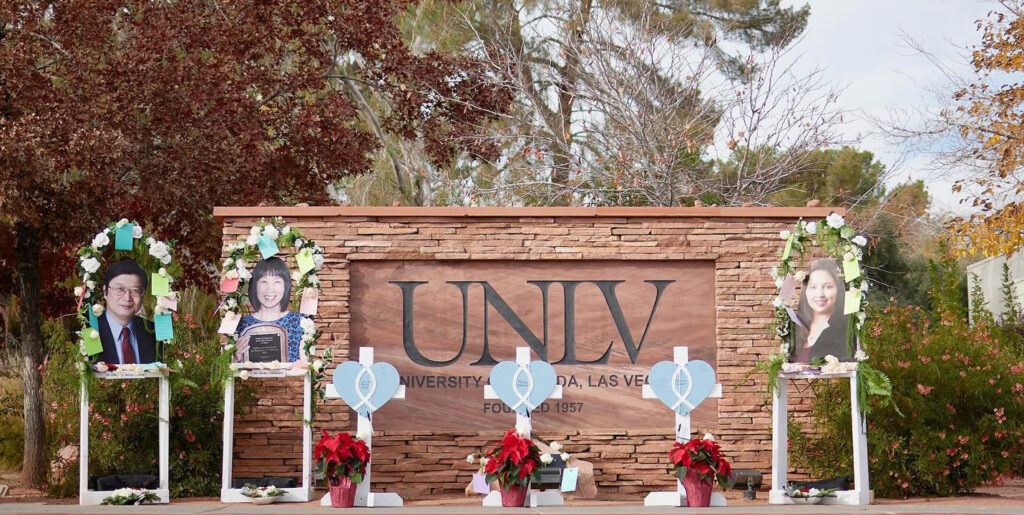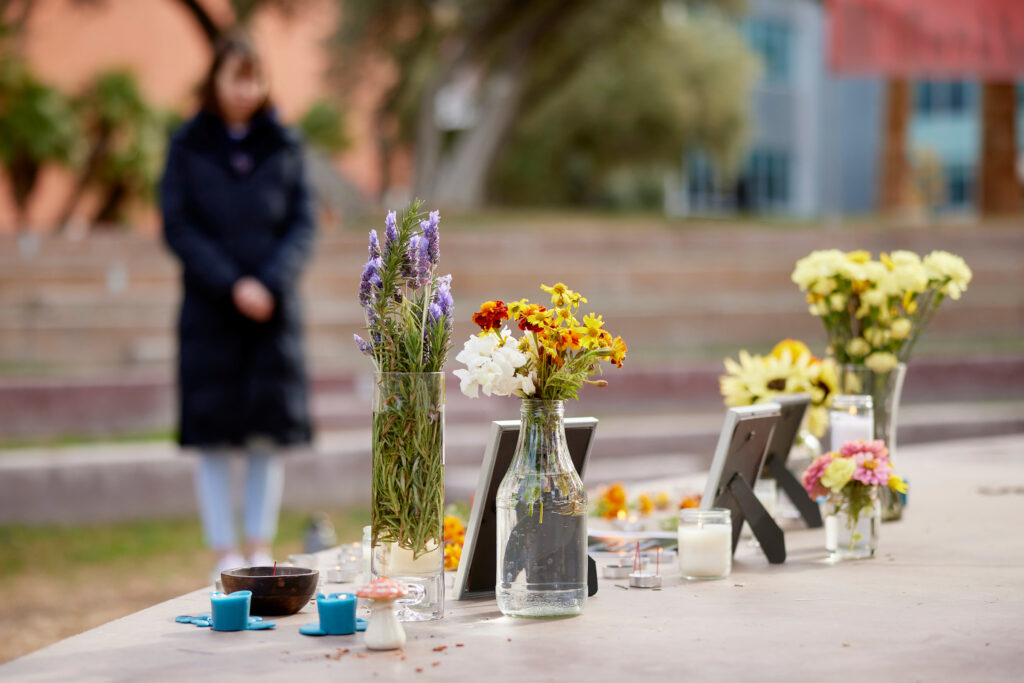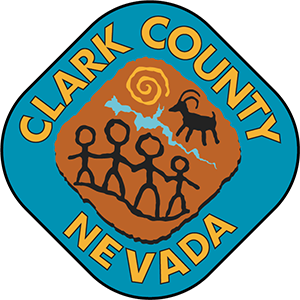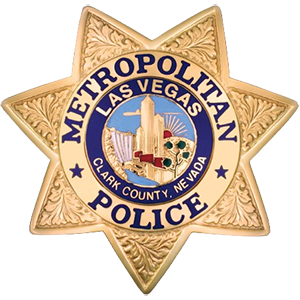
Support for the December 6 Tragedy at UNLV
The emergency fund for the University of Nevada, Las Vegas mass shooting that was set up by the Resiliency & Justice Center in conjunction with Clark County, UNLV, and the UNLV Foundation closed on June 1, 2024. We are incredibly thankful for all the contributions, and the families of the deceased and injured are grateful for the community support. A total of $165,375.21 was donated to the Vegas Strong Resiliency & Justice Center UNLV Fund by 414 individuals! Distributions were given per donor intent with remaining donations going to the families based on an equal division.
Our center continues to work with all those impacted by the December 6, 2023, tragedy at UNLV to connect them with ongoing resources for support, including legal assistance, weekly support groups, mental health providers, integrative services, peer support, and financial reimbursement through Nevada’s Victims of Crime Program (VOCP). The staff and students of UNLV have been some of our most dedicated partners committed to improving the community. Our advocates and community partners are here for victims and their families, those suffering physical and emotional injuries, and others impacted.
We are located at 2915 W Charleston Blvd, Suite 100, Las Vegas, NV 89102, and open Monday through Friday, 7:30 a.m. to 5:00 p.m. Individuals can also find help by submitting our General Intake Form or calling our main line at 702-455-AIDE (2433). The center is a safe haven; we ask for all media inquiries to be directed to Christine Smith, who can reached at csmith@lacsn.org.
Advocate Assistance
Our trauma-informed staff can help you in completing applications for the Victims of Crime Program (VOCP), connecting with the services that are listed here and others that become available, and providing further information. Even if you believe you do not need services, we encourage speaking with our staff for info about connections or support and for any possible future needs. You may contact us directly or click here to complete a virtual intake.
Support Groups
- Online Support Group for Faculty & Staff – Alice Goldstein, MA, facilitates this group on Thursdays at 9:00 a.m. in English via Zoom. Click here to learn more or register.
- Adam’s Place – This virtual grief and bereavement support group for adults meets on the third Thursday of each month at 6:00 p.m. It is facilitated by two nursing professors, including one from UNLV. Anyone can register 24/7 on their website, adamsplacelv.org.
Behavioral Health Navigation
The Resiliency & Justice Center has a dedicated Behavioral Health Navigator who can find and connect survivors with trauma-trained therapists in our community who will take their insurance or Victims of Crime Program funding. This will assist in connecting with services in a timely manner, finding a therapist who works with trauma and has experience in mass casualty events. Please fill out the general intake form and indicate a need for mental health to get started.
Debriefings with Departments
This is not therapy, but can be a first step to recovery. Debriefings serve as an opportunity to begin to discuss what people experienced, their thoughts, feelings, any symptoms of trauma, and coping skills and resources. These are usually one to two hours and held over Zoom. Reach out directly to Jackie Harris, Behavioral Health Program Coordinator at the Resiliency Center, if interested at J.Harris@dcfs.nv.gov.
Victims of Crime Application
The State of Nevada administers a Victims of Crime Compensation Program, which can provide assistance that includes counseling, lost wages, or medical support. Our staff will assist in completing applications and identifying potential benefits. We encourage all impacted persons to apply for any current or future needs. You may request assistance directly or complete a virtual intake here on our website.
Integrative Services
Online group sessions focused on activities such as yoga, mindfulness, meditation, and art therapy are available at no-cost to all those impacted by the tragedy at UNLV. Find details and a request form at ResiliencyAndJustice.org/integrativeservices.
HEART Peer Support
HEART (Healing, Empowering, And Rebuilding Together) is a program of trained volunteers who were impacted in various ways by the shooting at the Route 91 Harvest Festival in 2017. They are trained in evidence-based best practices to support one another and are guided by trauma-informed providers and clinicians who must complete their own rigorous training. Visit ResiliencyAndJustice.org/HEART to learn more.
Additional Services
Catherine and Elizabeth Scherwenka have led sessions for the community recovering from the Route 91 tragedy to help guide and facilitate healing, and they will offer free, online meditations for anyone in need of some support on Tuesdays at 12:00 p.m. Click here to learn more or sign up.
The University of Nevada, Las Vegas, is offering their their students in-person, drop-in crisis support services through Student Counseling & Psychological Services (CAPS) in collaboration with UNLV PRACTICE, CICFC, and clinical faculty. Telehealth crisis services remain available for students by calling 702-895-3627. Go to their mental health resources page to find additional options for students, faculty, and staff.
The Nevada Psychological Association maintains a list of disaster response resources that includes local and national therapists who are willing to provide pro bono (free) services to anyone in need.
For a list of all online and in-person activities hosted by the Resiliency & Justice Center and our community partners, please consult our Calendar page. Various workshops, support groups, integrative service sessions, trainings, and other events are available in English and Spanish. We update the calendar frequently, so please check back regularly for events that may interest you.
How to Help
Vitalant sent around 50 units of blood to an area hospital in response to the shooting, and they stand ready to provide more if needed. Those who want to support the blood supply are encouraged to make an appointment to give blood or platelets in the coming days and weeks. You can learn more at vitalant.org, use the Vitalant app, or call 1-877-25-VITAL.
If you’re a licensed behavioral health services provider or provider of integrative services (such as music therapy or yoga) and you’re interested in offering trauma-focused and trauma-informed services to those impacted, we welcome your help. We also oversee the HEART Peer Support program, in which survivors, family members, and others impacted by the October 1, 2017, tragedy at the Route 91 Harvest Festival provide continuous support to matched peers as needed. Please click here complete an interest form.

Other Resources
The Resiliency & Justice Center knows that hearing details of events like this can be triggering and overwhelming for so many others, especially those who have experienced trauma in the past. Please know that it is normal to experience stress symptoms or feel re-traumatized in the wake of such events.
We recommend and assist several weekly support groups facilitated by trained professionals who foster a safe space to share your feelings with others who understand what you’re going through, HEART Peer Support, integrative services, and a number of helpful online and in-person events. For mental health support outside of regular business hours, please call or text the Disaster Distress Helpline (1-800-985-5990), call or text 988, or chat on 988lifeline.org.
We also highly recommend the resource guide developed by our partners at the National Mass Violence Victimization Resource Center intended for all those impacted by the tragedy. Click here to view or download the guide from the NMVVRC.
You can go to unlv.edu/unlvstrong for updates from the university.




